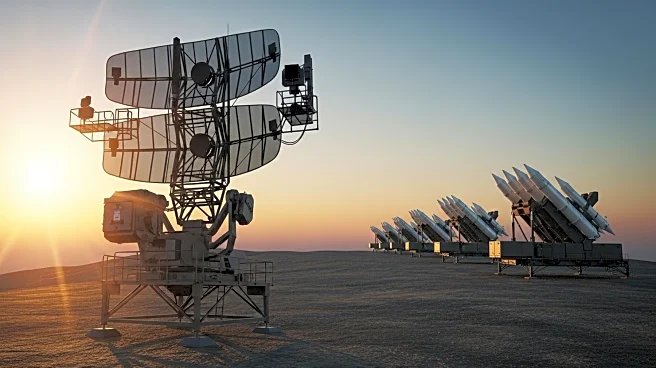What's Happening?
NATO has announced a significant enhancement of its defensive posture on its eastern flank, which borders Belarus, Russia, and Ukraine. This move comes in response to recent incursions by Russian drones into Polish territory. The alliance's supreme commander in Europe, U.S. Gen. Alexus Grynkewich, introduced a new operation named Eastern Sentry, which will incorporate equipment from France, Denmark, Germany, and the U.K. into existing air and ground-based defenses. The operation aims to address gaps in the defense line and improve communication across NATO's eastern flank. French President Emmanuel Macron has committed to deploying Rafale fighter jets to Poland, while the U.K. has imposed new sanctions on Russia's oil revenues and military capabilities. The incursion has heightened concerns about the potential expansion of Russia's ongoing conflict in Ukraine.
Why It's Important?
The bolstering of NATO's defenses is a critical measure to deter further Russian aggression and reassure member states of their security. The deployment of additional military resources underscores the alliance's commitment to collective defense and the protection of its eastern members. The situation highlights the ongoing geopolitical tensions in Eastern Europe and the potential for conflict escalation. The new sanctions imposed by the U.K. aim to cut off financial resources critical to Russia's military operations, thereby increasing economic pressure on Moscow. This development is significant for U.S. foreign policy, as it reinforces the importance of NATO's role in maintaining regional stability and countering Russian influence.
What's Next?
NATO's enhanced defensive measures are likely to provoke a response from Russia, which may include further military maneuvers or diplomatic protests. The alliance will continue to monitor the situation closely and may consider additional deployments or sanctions if Russian provocations persist. The U.N. Security Council is set to discuss the drone incursion, which could lead to further international diplomatic actions. Meanwhile, NATO members will likely engage in discussions to ensure readiness and coordination in the face of potential threats.
Beyond the Headlines
The situation raises broader questions about the future of NATO's strategic posture and the alliance's ability to adapt to new security challenges. The increased military presence in Eastern Europe may lead to a prolonged period of heightened tensions with Russia, impacting diplomatic relations and regional stability. Additionally, the economic sanctions on Russia could have ripple effects on global energy markets and international trade.










